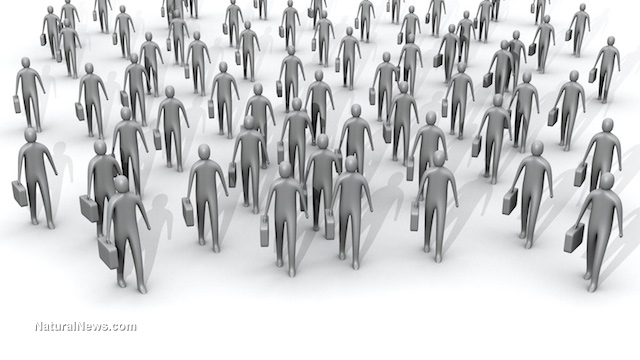Social media users' actions can be accurately predicted hours in advance
Sunday, September 21, 2014 by: L.J. Devon, Staff Writer
Tags: social media, behavior prediction, consumer habits

- DMSO and Natural Dyes: A suppressed cancer treatment resurfaces in independent research
- Aerosolized bioweapons? Strange “diploid biomasses” falling out of the sky in Florida captured under the microscope
- Transhuman vectors of disease: Young adults continue to produce spike proteins ONE YEAR after receiving COVID vaccine
- Prominent doctors call for new holistic therapies to address CANCER SPIKE: Tree barks provide anti-cancer treatment options
- Fermented foods like sauerkraut may outshine modern medicine in gut health, research finds
- Widespread social and economic unrest: Steve Quayle issues urgent financial warning of imminent asset collapse in new interview with Mike Adams
- 8 U.S. states may EXPAND vaccine exemptions in 2025, and parents have many reasons to STOP THE SHOTS
- Analysis: The coming economic collapse, a mass uprising and Trump's three secret weapons to halt the growing revolt
- Kiss Your Genetic Privacy Good-Bye! 23andMe Gets Green Light to Sell Your Intimate Genetic Details to Anyone They Want
- Ancient mummies rewrite human history with “ghost” lineage discovery
- Mike Adams releases country western hit single: Goin’ Back in Time is Comin’ Home
- Fauci is back in the limelight, and he’s busy promoting a future COVID or FLU pandemic
- U.S. lawmakers investigate Meta over alleged China collaboration
- Israeli lobbyists boast of controlling US national security policy in leaked AIPAC audio
- Surge in KIDNEY FAILURES linked to common medications
- Russia escalates censorship war, targets over 200 VPN apps amid Google resistance
- TAKE IT DOWN Act advances in Congress amid free speech concerns
- Mel Gibson sparks outcry over 9/11 ‘Biggest Scandal’ remark as unanswered questions resurface
- Israeli lobbyists boast of controlling US national security policy in leaked AIPAC audio
- Aerosolized bioweapons? Strange “diploid biomasses” falling out of the sky in Florida captured under the microscope
- Analysis: The coming economic collapse, a mass uprising and Trump's three secret weapons to halt the growing revolt
- Fauci is back in the limelight, and he’s busy promoting a future COVID or FLU pandemic
- Widespread social and economic unrest: Steve Quayle issues urgent financial warning of imminent asset collapse in new interview with Mike Adams
- Kiss Your Genetic Privacy Good-Bye! 23andMe Gets Green Light to Sell Your Intimate Genetic Details to Anyone They Want
- Mike Adams releases country western hit single: Goin’ Back in Time is Comin’ Home
- U.S. lawmakers investigate Meta over alleged China collaboration
- Tulsi Gabbard leads charge against the Biden regime’s global censorship of the 'Disinformation Dozen'
- Pfizer's RSV vaccine linked to preterm births as drug giant CONCEALED RISKS from pregnant women in unethical clinical trials
- Dane Wigington exposes climate engineering as ‘All-Out Weather and Biological Warfare’
- Shedding light on the dark side of MMR vaccines: How vaccinated individuals SPREAD MEASLES & put the vulnerable at risk
- TAKE IT DOWN Act advances in Congress amid free speech concerns
- CLOT SHOT PLANDEMIC UNFOLDING: Fibrous, rubbery clots caused by covid injections have prion-like seeding activity
- Chemtrails unveiled: How the CIA and Big Business are manipulating the weather for profit
- Curcumin’s ancient healing power supercharges muscle recovery, and its effects are compounded with anti-inflammatory foods and supplements
- Criminal referral requests filed against Fauci and top COVID officials in seven states
- Defunding DEADLY mRNA jabs: Government funding for mRNA technology being scrutinized and sidelined until proven "safe and effective" for real
- Newly released JFK files reveal Pentagon's role in creating Lyme disease and covid in the same lab
- Analysis: The coming economic collapse, a mass uprising and Trump's three secret weapons to halt the growing revolt
- Mike Adams releases country western hit single: Goin’ Back in Time is Comin’ Home
- Aerosolized bioweapons? Strange “diploid biomasses” falling out of the sky in Florida captured under the microscope
- Kiss Your Genetic Privacy Good-Bye! 23andMe Gets Green Light to Sell Your Intimate Genetic Details to Anyone They Want
- European Court of Justice: Healthcare professionals who promoted or administered COVID-19 vaccines are CRIMINALLY LIABLE for any harm caused
- Federal employees whine over DOGE's new directive requiring them to do a 5-point summary of weekly accomplishments
- Widespread social and economic unrest: Steve Quayle issues urgent financial warning of imminent asset collapse in new interview with Mike Adams
- U.S. approves new Russian ambassador as diplomatic thaw continues
- Government waste exposed: Hegseth supports Musk’s demand for accountability from federal workers
- Now you can HEAR chemistry: Health Ranger translates molecules into music in stunning video demonstration that will blow your mind (and your ears)
- Fauci is back in the limelight, and he’s busy promoting a future COVID or FLU pandemic
- CLOT SHOT PLANDEMIC UNFOLDING: Fibrous, rubbery clots caused by covid injections have prion-like seeding activity
- I Want My Bailout Money – new song released by Mike Adams
- I Want My Bailout Money – new song and music video released by Mike Adams
- Tulsi Gabbard leads charge against the Biden regime’s global censorship of the 'Disinformation Dozen'
- Trump administration poised to overhaul crypto regulations with new SEC leadership
- The Health Ranger releases “Vaccine Zombie” song and music video, using AI-animated zombies for the music video
- Red Cross issues warning to stop blood plasma donations from vaccinated people
- Scientists confirm: GENIUS brain function can be spontaneously unleashed in humans without any apparent cause
- EPA advisor admits the agency is funneling billions to climate groups ahead of Trump’s return to White House
- HYSSOP: What research reveals about the health benefits of this ancient holy herb
- Two containers with completed ballots fall out of truck in Florida
- Newly released JFK files reveal Pentagon's role in creating Lyme disease and covid in the same lab
- Global leaders unite to clamp down on “misinformation” with UN-backed Cascais Declaration
- Mike Adams releases country western hit single: Goin’ Back in Time is Comin’ Home
- BREAKING: 2025 NDAA authorizes mandatory military draft of WOMEN across America… as Pentagon pursues global NUCLEAR war with both Russia and China at the same time
- Michael Yon warns of a ZIONIST TAKEOVER in Trump’s second administration
- The Health Ranger releases “Vaccine Zombie” song and music video, using AI-animated zombies for the music video
- Ozempic and Wegovy weight loss drugs are injectable LIZARD VENOM PEPTIDES that may unleash a devastating wave of organ failure… side effects align with symptoms of SNAKE BITES
- BOMBSHELL: DNA testing kits are a SCAM to develop ethnic-specific bioweapons
- Israeli soldiers accused of even more torture and abuse in the West Bank
- I Want My Bailout Money – new song released by Mike Adams
- These 13 countries just signed an agreement to engineer a global FAMINE by destroying food supply
- NASA admits that climate change occurs because of changes in Earth’s solar orbit, and NOT because of SUVs and fossil fuels
- RFK Jr. clears key hurdle: Sen. Susan Collins backs controversial HHS nominee, signaling a new era for health policy
Analyzing credit card transactions, networking relationships, a person's likes and GPS locations to predict their lives in advance
By posting on social media, users are basically projecting their lives and recording it publicly. These social media actions and information are now subject to interception and interpretation by complex computer systems which create a model of the person's whereabouts and travels, basically stripping their privacy to the bone. Anything from networking relationships to location and daily plans can be analyzed and used to predict a person's whereabouts hours in advance. The data can be compared and contrasted with other information, including credit card transactions, email correspondence, GPS location and even monitored telephone calls.60 percent of social media data is usable for marketing purposes
Researchers at the Binghamton University have been working with Nathan Gnanasambandam, a senior researcher at the Palo Alto Research Center of Xerox Research to develop algorithms that predict human activity throughout the day. Using 500 million tweets, the researchers were able to map out human behavior hours before it occurred. The algorithm interpretations make human behavior seem almost robotic. The findings were published in Industrial Engineer.The results of the algorithm were more than 90 percent accurate for predicting behavior beforehand within a three-hour window. Even those social profiles with limited data were analyzable and predictable, showing how well the algorithms assessed anonymized data. Overall, the researchers found that the predictions were useable 60 percent of the time, for marketing and traffic prevention purposes especially.
The technology can help prevent a traffic jam altogether, instead of just rerouting a driver after a jam occurs. Xerox Research already uses complex algorithms to help with traffic flow. The New York State Thruway's EZ-Pass system and parking services are run by this kind of technology. Xerox also runs call and email help desk contact centers. Fusing this data into the algorithm allows companies to know why a person is calling before they even call. This data can be used to transfer customer service and troubleshooting calls to the correct department before a customer even voices a word.
The research team even mentioned that the technology could be used to solve healthcare problems before they ever occur. Researchers can build tools to help pharmaceutical companies connect with doctors, delegating prescription drugs to patients, possibly before they are even checked out and diagnosed.
Computers dictating people's lives, literally
This research can possibly make society more efficient, but it also makes humanity look socially robotic. Not only does the technology predict an individual's life, but by communicating back to the individual, the algorithm is essentially guiding or directing the person where it deems fit.This shows that computers can have a huge influence over people's lives, directing them through their day.
Are people's lives really this programmable?
Are people really becoming this predictable and zombie-like?
How important is your privacy and free will?
Sources:
http://discovere.binghamton.edu
Social media at FETCH.news
Get independent news alerts on natural cures, food lab tests, cannabis medicine, science, robotics, drones, privacy and more.
Take Action: Support Natural News by linking to this article from your website
Permalink to this article:
Embed article link: (copy HTML code below):
Reprinting this article:
Non-commercial use OK, cite NaturalNews.com with clickable link.
Follow Natural News on Facebook, Twitter, Google Plus, and Pinterest
Science News & Studies
Medicine News and Information
Food News & Studies
Health News & Studies
Herbs News & Information
Pollution News & Studies
Cancer News & Studies
Climate News & Studies
Survival News & Information
Gear News & Information
News covering technology, stocks, hackers, and more



"Big Tech and mainstream media are constantly trying to silence the independent voices that dare to bring you the truth about toxic food ingredients, dangerous medications and the failed, fraudulent science of the profit-driven medical establishment.
Email is one of the best ways to make sure you stay informed, without the censorship of the tech giants (Google, Apple, Facebook, Twitter, YouTube, etc.). Stay informed and you'll even likely learn information that may help save your own life."
–The Health Ranger, Mike Adams













































